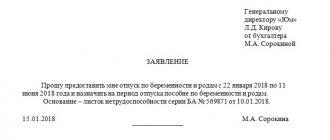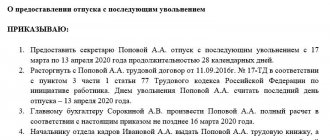Federal Law No. 197: Official text and definition of internship
For all employees who are hired for the first time, a probationary period and training are provided. Over a certain period, the new employee will have to acquire the skills necessary for successful work activities. During the entire internship period, the employee is monitored by managers who can decide to accept him for a permanent position or to dismiss him due to non-compliance with the assigned tasks.
The official text of the contract establishes the period during which the internship and instruction takes place. Most often this is a period from 2 weeks to 1 month. Sometimes the period can last several months. Federal Law 197 contains the main provisions regulating the passage of the trial period. The following standards apply:
- a clause on the duration of the internship and its rules must be provided for in the employment contract;
- if the document does not contain the corresponding section, the employee is immediately hired for a permanent job;
- Even during the probationary period for new employees, the employer is obliged to comply with the provisions of current labor legislation.
For certain reasons, an internship is beneficial not only to the employer, but also to the employee himself. It allows you to get an idea of how well an employee can cope with the responsibilities assigned to him. And during the trial period, the employee himself can understand whether the proposed conditions, team, etc. are suitable for him.
Reason for internship
In addition to the internship period for managers and specialists, the legislation also establishes the reasons for conducting training. Thus, individual internships for managers, specialists, workers and junior service personnel are arranged in the following cases (clause 9.1 of GOST 12.0.004-2015):
- when starting a job;
- when transferring to another place of work with a change in position or job function;
- in order to prepare for a possible replacement during the absence of a permanent employee;
- to obtain best practices and effective organization of labor protection work.
On what grounds is a probationary period established?
In most cases, the employer decides on the duration of the internship and its necessity independently. However, in some circumstances he does not have the right to assign a probationary period to a future employee. This happens if certain categories of residents apply for the position:
- persons who have passed the competition to fill a vacant position;
- women raising children under one and a half years old, or pregnant women;
- a minor under 18 is applying for employment;
- a citizen who has received higher or secondary vocational education in institutions that have confirmed state accreditation. In addition, the employer will not be able to refuse an applicant who is applying for a job for the first time after receiving an education diploma. There is one exception - if more than a year has passed since completion of training, a probationary period may be assigned;
- specialists who have been transferred to a new position from another branch of the company do not undergo internships, in accordance with the current agreement between management;
- employees whose employment contract is valid for no longer than 2 months.
Read also: Unauthorized occupation of a plot of land
As for other cases, the decision on the need and duration of the probationary period is made directly by the employer. We suggest downloading the internship law from the link below to familiarize yourself with the main provisions of the document.
How is the internship paid?
An important question for potential employees is how payment is made during the probationary period. According to current legislation, every person applying for a new position has the right to fair and timely payment for their work. This also applies to cases where a probationary period is first assigned.
The provisions of the law regulate that any work must be paid depending on the position held, the qualifications of the employee, and how difficult the work process is. Such legislative standards should be interpreted as the employer’s obligation to pay for the activities of a person undergoing an internship.
Another thing is that in some cases the employer has the right to set a lower salary during the probationary period. However, the final amount cannot be lower than the minimum wage established by federal officials.
What is the established duration of the internship - how many days does it last?
The duration of an on-the-job internship depends on the specifics of the enterprise’s activities and the specific employee. The standard period is from 2 to 14 working days (shifts) in accordance with clause 7.2.4 of GOST 12.0.004-90 “System of occupational safety standards. Organization of occupational safety training,” but there may be more. Here is the same dependence as when determining whether an internship is mandatory: the more complex, qualified and responsible the independent work, the longer the internship period (a good example is medical internship, at least 1 year).
For jobs with special working conditions, the duration of the internship (and the examination after its completion) may be regulated by external legislation and industry regulations. For example, the duration and procedure for the internship of drivers of passenger vehicles are regulated by Regulation RD-200-RSFSR-12-0071-86-12 of the Ministry of Automobile Transport of the RSFSR of 1986.
In other cases, the duration of the internship is determined by the employer.
The period of internship at the workplace of the Labor Code of the Russian Federation is established only for fixed-term contracts - no more than 2 weeks (Article 59 of the Labor Code of the Russian Federation).
How long can the internship last?
The total period of probation and training is determined by the employer. The Labor Code today does not regulate the duration of internships. In each specific case, the duration of the period is determined individually and is prescribed when concluding an employment contract.
Article No. 70 of the bill sets the maximum permissible time limits for completing the probationary period. For management representatives, it cannot last longer than six months. This includes specialists occupying the following positions:
- managers;
- chief accountants;
- managers of structural divisions or branches;
- deputy managers.
For other categories of citizens, the duration of the internship cannot exceed 3 months, with the exception of situations in which the employment contract lasts only a few months. In such cases, the trial period lasts no longer than 2 weeks. A long-term (3 years) internship is also provided for persons who intend to become notaries.
A probationary period is required for those planning to become a driver. To drive freight vehicles, you must confirm your qualifications within 1 month; for drivers of passenger buses, you must work 50 hours (32 of them on the route they will be driving).
During the probationary period, absence from work is not taken into account, even if it is associated with temporary incapacity.
Why and when do you need an internship?
What is an internship?
The concept of “internship” is extended and can only be applied to a limited number of workers. For a number of categories of workers, mandatory training in safe work methods is provided before starting work. As well as testing the acquired theoretical knowledge through examination and practical testing - internship. It is important to understand that this procedure can only be applied to training future workers in the field of labor protection employed in harmful or dangerous working conditions. This is a principled position, which is enshrined in relation to internships in Part 3 of Art. 225 Labor Code of the Russian Federation.
Download documents from the article
Regulations on conducting internships at the workplace. DOCDOC fileEmployment contract with an intern: sample.DOCDOC fileInternship program at the workplace: sample. DOCDOC file Other required documentsFile information
During training, the employer, by teaching newcomers how to work safely, reduces the risk of industrial accidents and accidents in the future. After listening to the theoretical part, the candidate for the vacant position is given an on-the-job internship. And only after that it is possible to conduct an assessment of knowledge in the form of an exam.
The list of harmful and dangerous production factors is given in the List approved by Order of the Ministry of Health and Social Development of Russia dated April 12, 2011 No. 302n. This List contains such factors and work as:
- work at height;
- work related to the operation of electrical installations;
- work underground and underwater;
- work in certain climatic conditions;
- work associated with exposure to chemical, biological and other substances;
- other jobs.
When can a student agreement be concluded with an employee?
To know for sure that the money spent on training an employee was not in vain and that he will use the acquired knowledge to his advantage, it is necessary to conclude an apprenticeship agreement. If you follow the recommendations of the experts of the Personnel Directory magazine, the court will be on your side if the employee refuses to reimburse training costs.
The procedure for training and internship is regulated by:
- GOST 12.0.004-2015;
- Resolution of the Ministry of Labor and Ministry of Education of the Russian Federation dated January 13, 2003 No. 1/29.
The internship must be completed before starting independent work under the guidance of a mentor.
How to register an employee undergoing a probationary period
After management decides whether or not a probationary period is needed for a new employee, the internship must be registered. To do this in accordance with the provisions of current legislation, the following steps must be followed:
- the head of the organization signs the regulations on the creation of the internship. It contains information about the terms, the powers vested in employees during the probationary period, how their activities are paid, etc.;
- the applicant is interviewed;
- if the parties reach an agreement, an employment contract is drawn up;
- the new employee is working on a probationary period;
- after completion of the specified period, the manager makes a decision on the candidate’s suitability for the position held. Next, the employee is either fired in accordance with the internship regulations or hired legally.
Read also: Forced resignation
Even during the probationary period, a person must be registered in accordance with all the rules. To do this, they provide the HR department with an application for employment, a work record book, a diploma of education, and a photocopy of the passport. The employer has the right to issue a fixed-term contract, or an open-ended one, but indicating the duration of the internship period.
The provisions of the Labor Code allow employers to hire new employees on a probationary period. This gives them the opportunity to verify the employee's qualifications before he is placed on the main contract. The law determines that the duration of the internship, depending on the circumstances, cannot last longer than six months. In this case, the employer is obliged to pay for it.
Why and when do you need an internship?
From the contents of Art. 225, 212 of the Labor Code of the Russian Federation, it is clear that on-the-job training is needed to, under the guidance of an experienced mentor, give the employee the necessary practical knowledge and skills for further independent work. Especially for work in compliance with occupational health and safety standards.
Internship should not be confused with:
- with apprenticeship;
- with a probationary period;
- with student internship.
Find out more about a student’s internship in the article “How to write a reference for a student from an internship?”
The order for an internship always follows the order for employment, and the internship time is counted towards the length of service. The trainee's working time is reflected in the time sheets and work schedules of the unit and is paid without fail in the amount established by the employment contract.
Internship is a form of fulfilling legal requirements for labor protection and safety. Therefore, the more difficult the working conditions, the higher the responsibility for its results, the greater the need for an internship.
Internship is required in professions related to:
- with servicing people using vehicles;
- using sophisticated equipment and complex production processes, when there is an increased risk for both the employee and others;
- working with dangerous objects and substances;
- with serving people in additionally regulated areas: public catering, education, medicine, etc.
Read about additional regulation in the field of public catering in the material “Features of using UTII for cafes and restaurants.”








